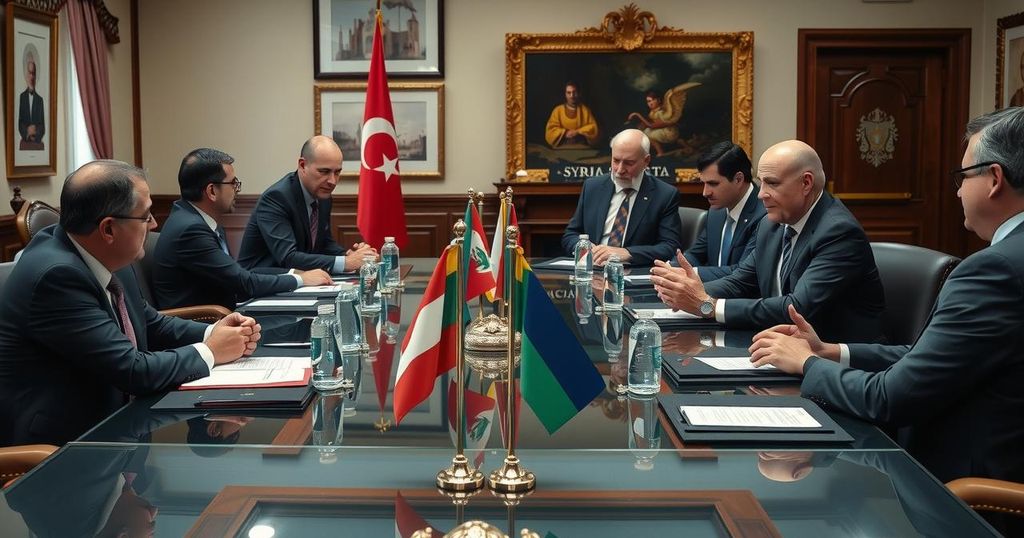Global news
AFRICA, AQABA, ASIA, DIPLOMACY, EGYPT, EUROPEAN UNION, FIGHTER JETS, GEIR PEDERSON, HA, INTERNATIONAL RELATIONS, JOE BIDEN, KA, KURDISH - LED SYRIAN DEMOCRATIC FORCES, LEBANON, MIDDLE EAST, NORTH AMERICA, PEDERSON, SYRIA, SYRIAN CONFLICT, SYRIAN DEMOCRATIC FORCES, TURKIYE, UNITED STATES, US
Jamal Walker
0 Comments
Diplomatic Gathering in Jordan Addresses Syria’s Political Transition
Top diplomats from the US, Turkiye, the EU, and Arab nations met in Jordan to discuss Syria’s future in the wake of President Bashar Assad’s ousting. Secretary of State Antony Blinken emphasized the need for an inclusive political transition. Turkiye plans to resume operations in Damascus, while the meeting notably excluded Russia and Iran, Assad’s main supporters.
In Jordan, top diplomats from the United States, Turkiye, the European Union, and several Arab nations convened to discuss the future of Syria amidst a shifting geopolitical landscape following the ousting of President Bashar Assad. US Secretary of State Antony Blinken led the American delegation, emphasizing the need for a political transition in Syria that respects minority rights. The gathering notably excluded representatives from Russia and Iran, key allies of Assad.
As Turkiye supports opposition forces against Assad, Turkish Foreign Minister Hakan Fidan announced the reopening of the Turkish embassy in Damascus. During discussions, regional diplomats sought clarification from Turkiye regarding its commitment to an inclusive political process that upholds Syria’s territorial integrity. The potential for conflict remains as Turkiye and the United States manage divergent interests concerning local militant factions.
Additionally, Blinken highlighted the critical moment for Syria, acknowledging both opportunities and significant challenges ahead. The meeting took place with heightened tensions, especially regarding the role of the Kurdish-led Syrian Democratic Forces (SDF), which remain crucial allies for the US in combating Daesh. In contrast, Turkiye views these forces as a threat due to their connections with the PKK. The diplomats left the session recognizing that there is much work to be done to find common ground in the pursuit of a stable Syrian future.
The ongoing civil war in Syria, which began in 2011, has disrupted the regional balance of power and led to the involvement of various international and regional actors. The recent shift in the political landscape, particularly with the weakening position of Bashar Assad, has prompted discussions regarding the future governance of Syria. Key players, such as the US, Turkiye, and Arab nations, are interested in establishing a stable and representative regime to prevent further conflict. However, complex relationships and historical tensions complicate these engagements.
The recent diplomatic meeting in Jordan signifies a concerted effort by the United States, Turkiye, and Arab nations to influence Syria’s future following the removal of Bashar Assad. With concerns over sectarian divisions and the presence of competing militant groups, the discussions reflect a cautious yet strategic approach to establishing a political framework that could ensure stability in the region. The conflicting interests amongst key stakeholders highlight the complexities of the path forward for Syria post-conflict.
Original Source: www.arabnews.com




Post Comment